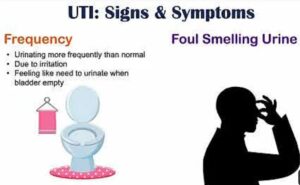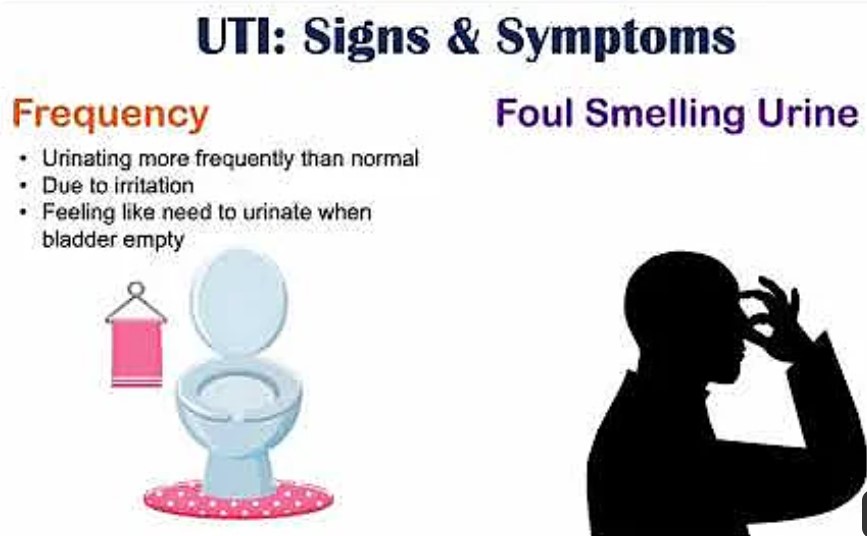Urinary Tract Infection or UTI: Causes, Symptoms, Treatment
Urinary Tract infections, UTIs are the commonest infections in our environment and one of the commonest reasons why most people come to the hospital. There are many possible causes of UTIs, but at all times, it is important to always check for the presence of any underlying condition that can predispose you to recurrent UTIs.
What is Urinary Tract Infection, UTI
The term UTI is often used to describe inflammation (swelling) of parts of the urinary tract, commonly the urethra (urethritis) & the bladder (Cystitis) due to infection by some microorganisms.

Other parts of the urinary tract such as the ureter and the kidneys can be infected too either separately or as a complication from these (urethritis or cystitis), but they are seldom referred to in the regular UTI presentation.
Causes of Urinary Tract Infection, UTI
The commonest agent that is usually implicated in most cases of Urinary Tract Infection, UTI is a bacteria known as E. coli.
Yes, I know you have heard of that name before. Every herbal medicine dealer is always using it to sing songs on the roads while marketing their products.
E.coli is the most common cause of UTI in our environment and is usually from the GIT. Hence, this is why we always advise people, especially ladies that when you want to clean your anus after defecation, do not clean towards the front, but rather clean to the back. This is to avoid bringing germs from the anus to your urinary tract. About 75% of UTI cases are due to e.coli.
Other causes of UTI include; Proteus spp, Enterococcus, Klebsiella, Pseudomonas, Candida, etc
Symptoms of Urinary Tract Infection, UTI/How do you know you may have UTI?
There are body changes that suggest that there is a problem in the urinary tract and that the patient may have a UTI. You should suspect the possibility of a urinary tract infection when you;
- Pass urine more often than usual. That is, there is an increase in the frequency at which you pass urine. To make it simple, if you urinate up to or more than 8 times during the day or 3 times at night, then you should be concerned. (Frequency)
- cannot ignore the urge to pass urine. If you get pressed now, you can not hold it. You have to go and release it, or else, you might mess yourself up. (Urgency)
- feel pain anywhere from your lower abdomen to your penis/vagina anytime you pass urine. (Dysuria)
- have a feeling to go and urinate again, not long after you just urinated. (Incomplete voiding/strangury)
- pass cloudy urine with an unpleasant odour.
- notice that there is blood in the urine. This is known medically as Haematuria, and it is not a good sign.
- Fever may or may not be present.
When symptoms such as fever, and rigors, are present with other symptoms above, it often suggests that the kidneys may be involved (Acute Pyelonephritis) and indicates an urgent need to seek care from your doctor.
How do you test for Urinary Tract Infection or UTI?
You can test for Urinary Tract Infections using a simple Urinalysis test with a urine dipstick. This can be done at the laboratory at the request of a doctor.
Other tests that can be done are; Urine microscopy and Urine culture
What risk factors can make you more susceptible to having a UTI
- Females: because they have a shorter urethra, which makes the urinary tract very close to the anus, hence urinary tract infections are more common in females than males.
- Sexual Intercourse can cause trauma to the urethral wall and also introduce microorganisms from the surrounding skin into the Vaginal during penetration. Some persons advise that you urinate immediately after sexual intercourse to reduce the chances of urinary tract infections.
- Urinary instrumentation such as Urethral catheter
- Foreign bodies in the urinary tract (e.g stones)
- Bladder Outflow Obstruction (e.g. BPH, Urethral stricture, Cancer of the Prostate.
- immunosuppression e.g. Diabetes, malnutrition.
Treatment: How do you treat Urinary Tract Infection, UTI
Anyone having symptoms of Urinary Tract Infection should proceed to see a doctor to investigate further and rule out other more serious conditions that can cause similar symptoms e.g.: Cancer of the Prostate.
Your doctor would prescribe effective ANTIBIOTICS for you and you should finish your prescription, even if the symptoms have been relieved, to Prevent them from recurring. Choices of effective antibiotics include; Trimethoprim, Ciprofloxacin, or Nitrofurantoin.
Regular FLUID INTAKE of at least 2l/day is also recommended.
Recurrent Urinary Tract Infection, UTI
A person is said to have recurrent urinary tract infections when the organism persists on repeat culture despite treatment or when there is reinfection with any organism after an interval.
Frequent infections describe patients having 3 or more urinary tract infections in a year.
Recurrent UTI may need to be investigated especially when unusually severe or when frequent (as described above) since it often suggests some underlying medical condition that needs to be addressed.
In the presence of an underlying cause, recurrent urinary tract infections may be lethal and can lead to permanent renal damage. So the patient must consult their doctor.
What can Cause Recurrent Urinary Tract Infection, UTI
Recurrent infections are commonly noticed in individuals who have;
- Obstruction: this could be caused by stones in the kidney, ureter, or bladder obstructing the flow of urine. In Children, a congenital condition known as Posterior Urethral Valve (PUV) can cause obstruction. This obstruction causes urine to accumulate in the system, and urine accumulation/stasis favours the growth of bacteria and other microorganisms.
- Immunosuppression: which can be seen sometimes in pregnancy, poorly controlled diabetes, elderly people, IV drug users, etc.
- Circumcision: individuals who were not circumcised have been observed to have more cases of UTI because the foreskin of the penis can harbour germs and microorganisms.
You can adopt the following preventive measures for recurrent uncomplicated infections without underlying causes;
- Fluid intake of at least 2L/day
- Regular complete emptying of the bladder
- Good personal hygiene
- Emptying of the bladder before & after sexual Intercourse
- CRANBERRY JUICE may be effective.
Feel free to ask any questions you might have below, and I’ll do my best to get back to you.






